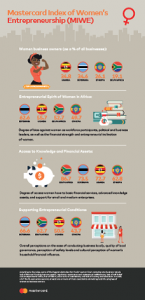Following the release of the Mastercard Index of Women’s Entrepreneurship (MIWE) today, it was revealed that 34.8 percent of businesses in Uganda are owned by women, making it one of the top performing African countries highlighted in the index.
The MIWE is a weighted index that helps to better understand and identify factors and conditions that are most conducive to closing the gender gap among business owners in any given economy. The three factors include Women’s Advancement Outcomes, Access to Knowledge and Financial Services, and Supporting Entrepreneurial Factors. For the 2016 Index, Mastercard examined 54 different economies around the globe, including Botswana, Ethiopia, South Africa and Uganda.
Uganda scored particularly well in terms of advancement outcomes: the women entrepreneurial activity rate was 100 percent, with its labour force participation rate at 93.9 percent, making the country top in these areas worldwide. Uganda also excelled in sharing knowledge assets with women and providing financial access, with 90.5 percent borrowing or saving to open a business – higher than the 52.4 percent average of other low to lower middle income countries – and a 95.8 percent gross women tertiary education enrolment rate.
When compared to other African markets surveyed Botswana leads the charge with the highest rate of women’s advancement outcomes, at 62.6 percent, and was also rated highest (66.6 percent) for providing supportive entrepreneurial conditions. South Africa earned the top spot for women’s access to financial instruments and knowledge assets in Africa, with 86.7 percent of the populace’s women entrepreneurs having access to knowledge assets and capital.
The Index results revealed that female entrepreneurs in developing countries are driven by resilience, determination and the desire to provide for their families. The findings reinforce that women entrepreneurs are the backbone of economic growth and powerful engines of development and financial inclusion, especially in Africa. Women in these emerging markets tend to tap into local business opportunities that do not rely on knowledge or innovation alone – effectively allowing them to avoid financial, regulatory or technical constraints.
“The result of this survey collaborates an economic reality in Africa that women continue to overcome formidable challenges to remain a cornerstone of trade and productivity on the continent,” says Daniel Monehin, Division President for Sub-Saharan Africa and head of Financial Inclusion for International Markets at Mastercard.
“To further boost entrepreneurship among women in Africa, Mastercard has collaborated with a number of partners in the public and private sectors in our markets across Africa to drive greater levels of female entrepreneurship and inclusion in the economy. These include Mercy Corps, Youth for Technology Foundation, UN Women and Junior Achievement South Africa.”
According to the Index, some of the main challenges that currently prevent women from venturing into business include lack of financial funding or venture capital, regulatory restrictions and institutional inefficiencies, lack of self-belief and entrepreneurial drive, fear of failure, socio-cultural restrictions, and lack of training and education.
These constraints are acting as barriers preventing women from starting businesses in the majority of the 54 countries surveyed. For instance, the survey found that even in Australia – ranked seventh overall – the rate of women borrowing or saving to start their own business was only 35.5 percent, below the average of 38.5 percent of other high income economies. In France, another high income economy, that rate was 36 percent while in Ireland it was 30.3 percent.
Click here to see full report
Although New Zealand topped the Index and was followed by predominantly developed markets based on their robust small and mid-sized business communities, high quality of governance and ease of doing business. Women entrepreneurs in Africa and other developing markets have proven to be equally vibrant, resourceful and innovative in finding opportunities to improve their own lives as well as create a better future for their children.
An interesting outcome of the Index is that cultural perceptions of women entrepreneurs in Africa are predominantly positive – at 68.8 percent in Uganda, this is well above the average of 41.3 percent.
“We cannot underestimate the contribution women entrepreneurs make in Africa, more must be done to support them to ensure they are able to sustain and grow their businesses. These resilient business owners are a vital part of a thriving ecosystem, and Africa is showing the rest of the world that they are serious about supporting women in business as it develops a more financial inclusive continent,” Monehin concluded.
















